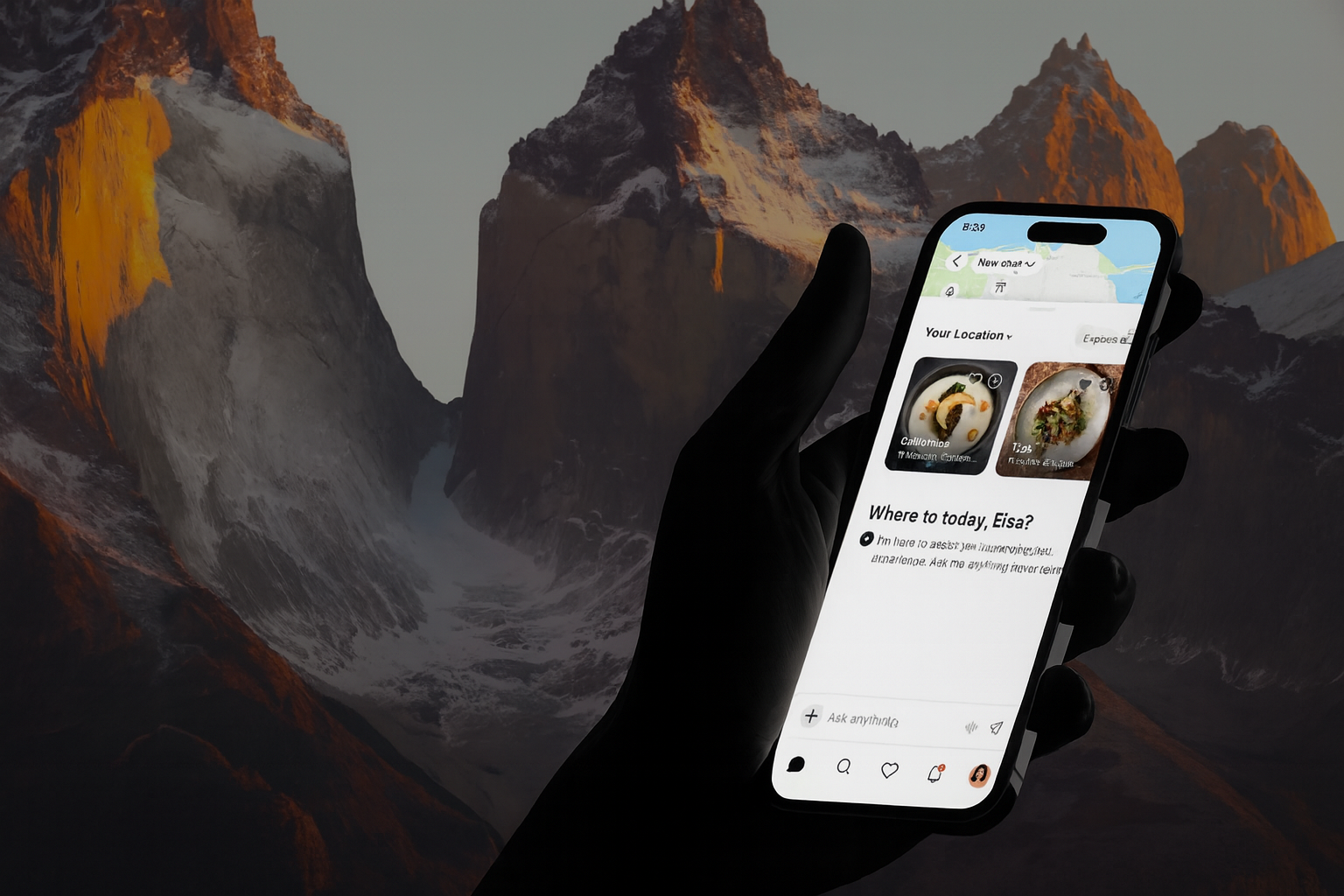Recently, I got really into mussels. One evening, I found myself craving some and did what most people still do—I opened Google Maps, typed in “mussels,” and scrolled through local restaurant reviews. It worked. Not fancy, not futuristic, but it did the job.
Still, it got me thinking: what would AI do with that same question? Could it take things further—maybe suggest a spot based on mood, time of day, or even pair it with a walk by the river? So I decided to try a few of the new AI travel tools everyone’s been talking about.
Most of them use ChatGPT under the hood, often wrapped in a shiny interface. Some were fun, a few gave answers that didn’t make sense—or listed places that didn’t even exist. In a lot of cases, they basically just repackaged Google Maps results… and then tried to charge me for it.
But there’s no denying AI is becoming a bigger part of how we travel. From building entire itineraries to giving real-time recommendations on the go, it’s quickly moving from novelty to necessity. The global travel tech market is set to top $13.38 billion by 2030, with AI leading much of that growth, according to a research report “Artificial Intelligence in Tourism Market.
And the numbers back it up. A recent Accenture survey of 18,000 travellers across 14 countries found that 80% are already using generative AI for travel, and over half are open to letting it plan and book their entire trip. Statista reports that in 2025, nearly four in five consumers will be using AI to plan, book, and experience travel.
One of the startups riding this wave, Mindtrip, has seen explosive growth—racking up almost 350,000 monthly visitors from the US in just five or six months, according to Ahrefs. Clearly, there’s demand for smarter, easier trip planning.
So, I gave some of these tools a proper try. Martin and I from Locals Insider, tested a handful of the most talked-about AI travel planners—from chatbot-style platforms to surprise deal finders based on your vibe. Most were fun to play with, a couple were a bit clunky, but one we really liked. It was quick, easy, and actually useful. No fluff—just solid, stress-free travel help that made the whole process feel simpler.
Best AI Tools for Travel Planning: Ranked and Reviewed
Mindtrip
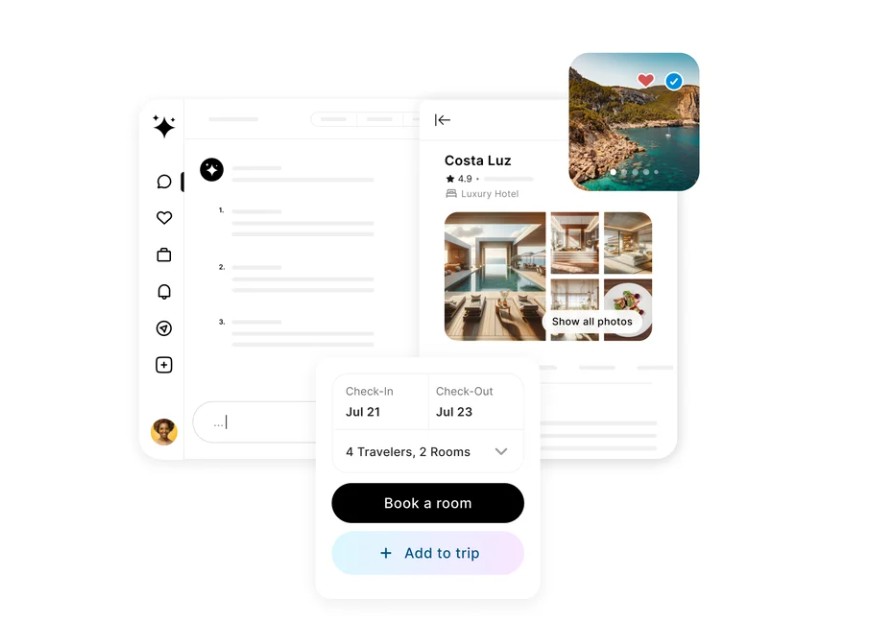

Mindtrip is one of the most versatile AI travel planners on the market, even earning a spot on Fast Company’s list of “Most Innovative Companies of 2025.” At its core, it works like a chatbot (similar to ChatGPT, but for travel) layered on top of an interactive Google map.


You can type in a city or “I am going to Buenos Aires, where to hang out with good music”, upload a screenshot, or paste a blog link, and Mindtrip will generate places to explore—cafés, museums, beaches—complete with practical details like opening hours, addresses, guides from locals and reviews. Compact Google.com AI overview answer but on Mindtrip layout.
With one click, you can drop spots into your itinerary, or explore guides from other travelers who’ve tagged the same places. The “Start Anywhere” feature means you don’t need a plan to begin—almost any piece of inspiration becomes a trip.
It’s also an organizer: upload receipts, sync recommendations with Google Maps, or use group chat to plan with friends.
Pros: flexible, visual, collaborative, free iOS app with a good customer rating of 4.9.
Cons: occasional AI “hallucinations,” so double-check locations.
For creators, Mindtrip adds a business angle: Magic Links and interactive guides let influencers monetize tips through sign-ups, bookings, and commissions.
Trip Planner AI (Now Layla)
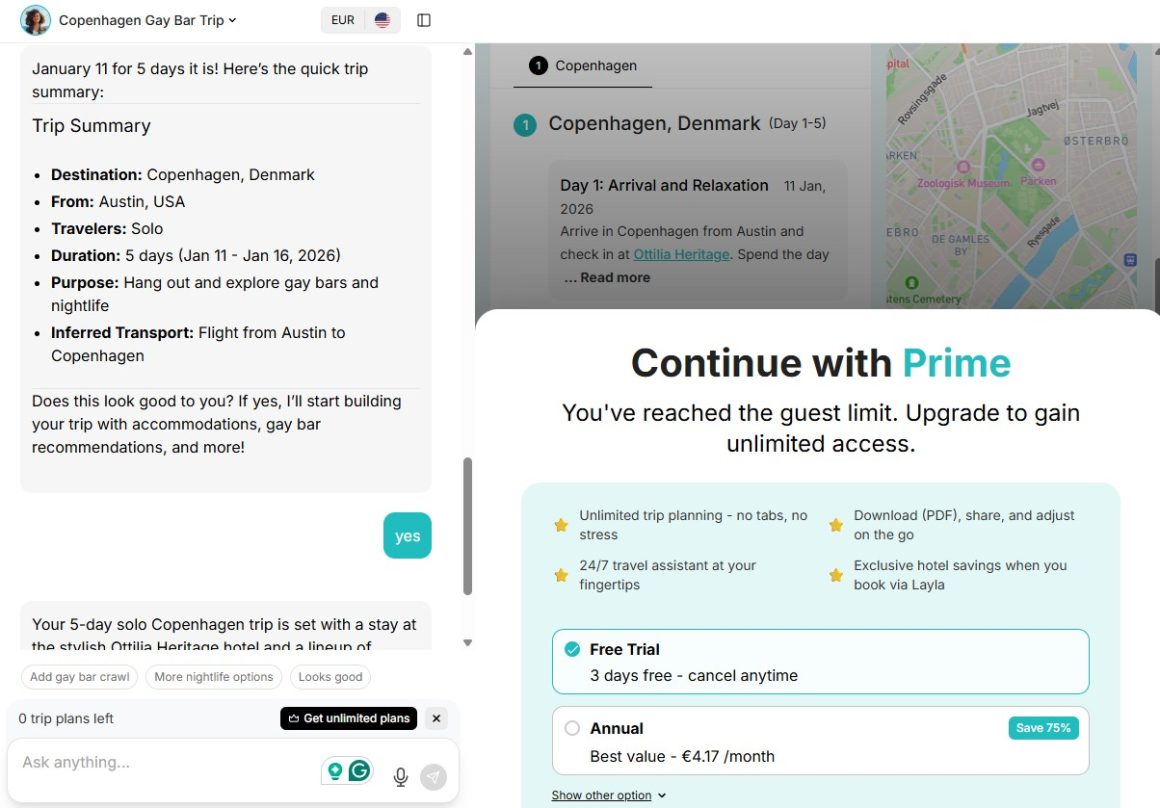

Trip Planner AI pitches itself as the ultimate all-in-one planner. It pulls in inspiration from TikTok and Instagram Reels, claims to optimize your route, and even has a community where travelers share their own itineraries—ten days in Tokyo, five in Rome, a week in New York. In reality, it feels more like talking to a pushy travel agent bot.
When I tried it for Copenhagen, asking about gay bars, it didn’t return results straight away. Instead, it asked a string of questions: where I was traveling from, who I was with, how many days, what the purpose was (party, culture, relaxation, adventure), and eventually the exact dates. Only after all that did it generate a “5-Day Copenhagen Gay Bar Hangout” itinerary. But before I could see it, a subscription window popped up. To unlock, I had to pay for “Layla Prime”: €24.99 per month or €49.99 per year, with just a three-day trial. Without paying, you can’t even preview the plan.
The “free” guides and activity suggestions are largely affiliate-driven, pulling from GetYourGuide and Viator. That means Trip Planner AI earns commission when you book, though in most cases you could go directly to those platforms yourself.
Pros: community itineraries, claims of route optimization, group planning.
Cons: repetitive questioning, heavy paywall, feels like Google Maps plus ChatGPT dressed up as a premium service.
Locals Insider verdict: clever business, poor value for travelers—it blocks the plan before showing if it’s worth paying for.
GuideGeek – AI Travel Messenger
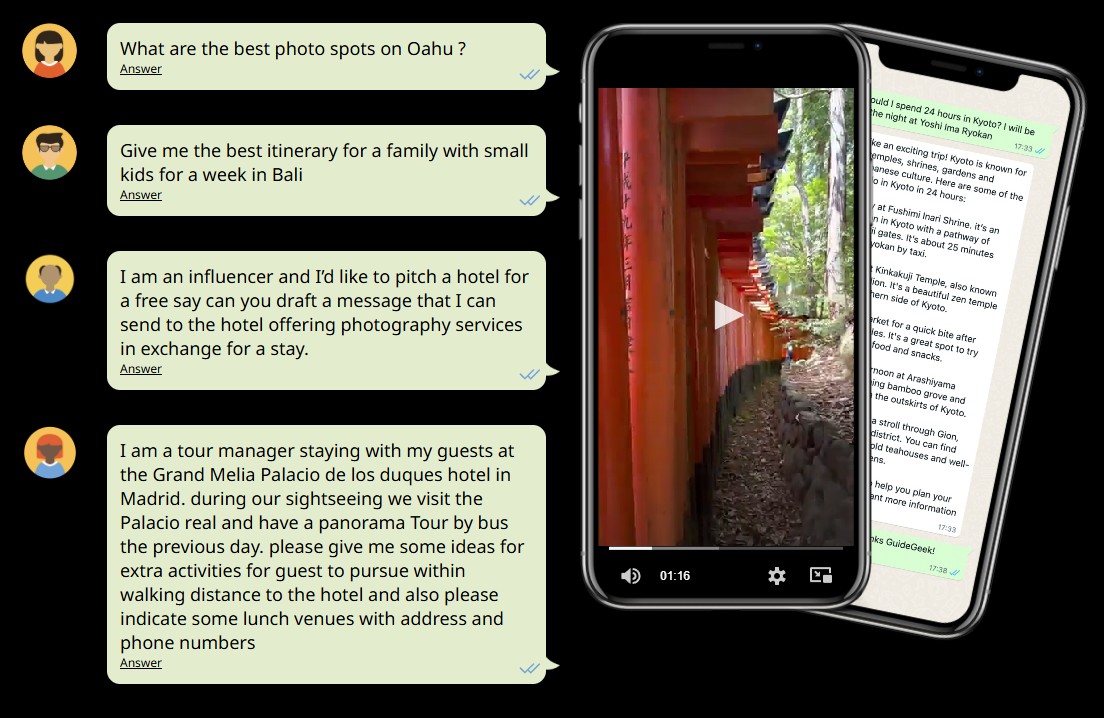

GuideGeek is an AI travel assistant that lives inside apps you already use—Instagram, WhatsApp, and Facebook Messenger. There’s no app to download—just send a message like you would to a friend. It can respond in more than 50 languages, which makes it useful if you’re abroad and need quick help with local customs or even slang. The catch: on WhatsApp it only works on mobile, not on desktop.
The service is designed for practical, real-time answers. Ask “Where can I eat mussels now in San Francisco?” and it will suggest a restaurant, complete with a link to its website or Instagram page, opening hours, and sometimes a phone number.


It can also follow up with questions like “Do you want more suggestions?” or “Do you want to know where to go after that?” Beyond food, it can suggest bars, nearby hotels, better routes, or cultural etiquette.
Pros: free, no app to install, works instantly in popular messengers, good for fast local suggestions.
Cons: WhatsApp desktop not supported, not as strong for full itinerary building, and like any AI, answers sometimes need fact-checking.
Tryp.com
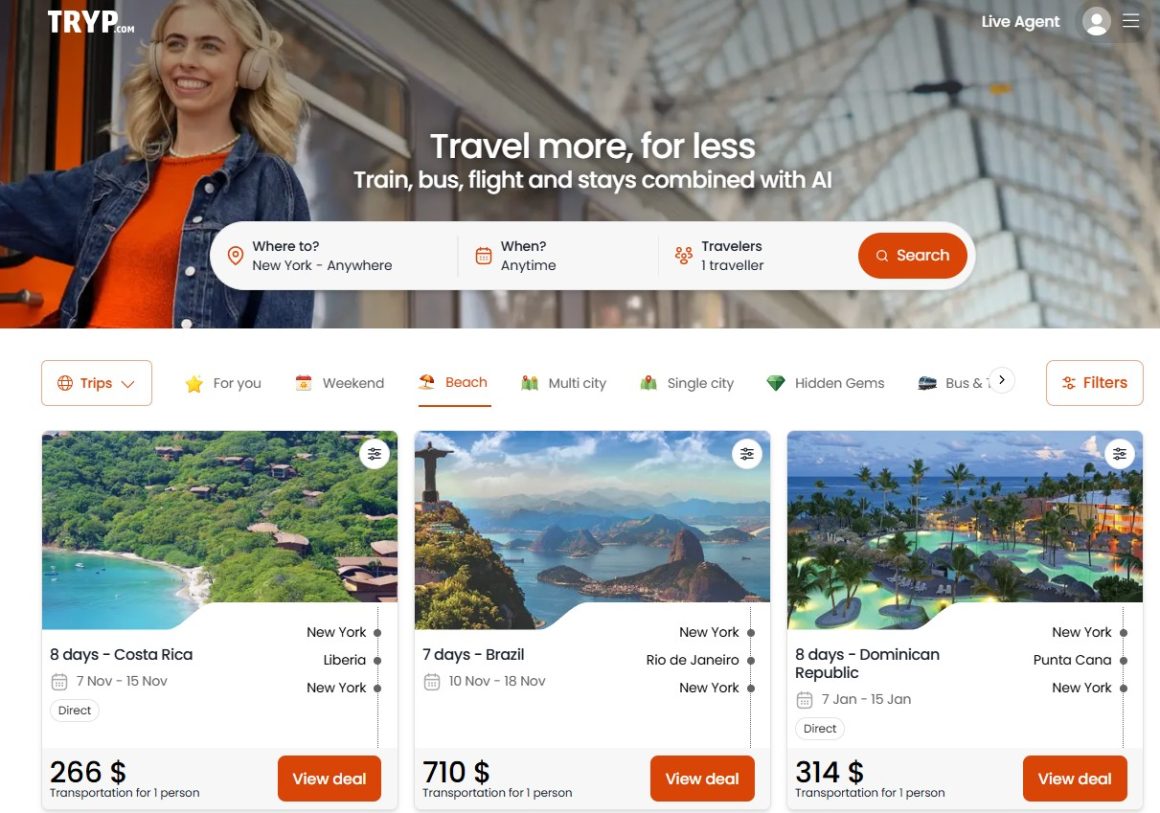

Tryp.com began as a startup in Denmark in 2020, when six engineering students decided to challenge the old “A to B” flight search model. Instead of just showing you the cheapest one-way, Tryp uses AI-powered “virtual interlining” to bundle transport and stays into one itinerary. In 2025, they closed an investment round exceeding $3.0 million, and the platform is now running smoothly.
Open the homepage and you’ll see ready-made deals tailored to your location: for example, New York—and the AI travel expert suggests trips you might not have thought of: eight days in Costa Rica for $266, a week in Brazil for $710, or eight days in the Dominican Republic for $314.
The design is also filter-based. You can toggle between Weekend, Beach, Multi-city, Single City, or Hidden Gems to see what the algorithm comes up with.
Prices are based on the cheapest dates the system can find, though you can override that if you need specific timings. Language and currency can be changed, and once you book, all reservations are stored in a single timeline. Boarding passes arrive automatically, and support is available 24/7.
Pros: genuinely cheap combinations, easy to filter by trip type, bookings in one place.
Cons: many offers are tied to low-cost carriers and shared hostels, which risks adding to overtourism in already strained cities.
You book on their site. Once booked, everything sits in a single timeline—flights, trains, buses, and hotels—and the system even auto-checks you in, sending boarding passes directly to your app or email.
For flexible, price-sensitive travelers it’s a gift; for those seeking comfort and authenticity, it works best if you refine the filters to select higher-end stays.
Expedia AI Trip Match


Expedia’s latest experiment brings together social media and trip planning. Instead of starting with a search bar, you begin with an Instagram Reel. See a video of Bora Bora’s overwater bungalows? Send it directly to Expedia’s Instagram account. Within moments, the AI responds with a suggested itinerary—four or five days broken down into activities, hotel recommendations, and links to book. In the Bora Bora example, it builds a plan with snorkeling, spa afternoons, a lagoon excursion with manta rays, and even an evening hike.
It’s essentially turning fleeting inspiration into a structured trip. Hotel options come rated, with reviews and booking buttons, and you can edit the plan if you prefer a slower or busier pace.
Pros: a direct bridge from social media inspiration to concrete plans, simple to use if you already live on Instagram.
Cons: still in beta, occasional odd matches, and less useful if your inspiration doesn’t come from Reels.
Wonderplan
Another AI trip-suggesting tool and itinerary planner, Wonderplan, builds itineraries by asking you a handful of questions at the start: destination, travel dates, trip length, budget level, who you’re traveling with, and interests ranging from food and nightlife to hiking, shopping, or festivals. You can also add dietary preferences like vegetarian or halal. After submitting the form and logging in (usually with a Google account), the AI takes a few minutes to produce a plan.
When we tried it for Boston, the system came back with 28 hotel options, from the HI Boston Hostel at around $100 per night to The Langham at $400+. The draft itinerary slotted in classic stops: Day 1 on the Freedom Trail, Day 2 at the Museum of Fine Arts and the Isabella Stewart Gardner Museum, and Day 3 at Fenway Park or the Boston Tea Party Ships. Each entry came with maps, times, and estimated costs—transport, food, and activity budgets clearly broken down.
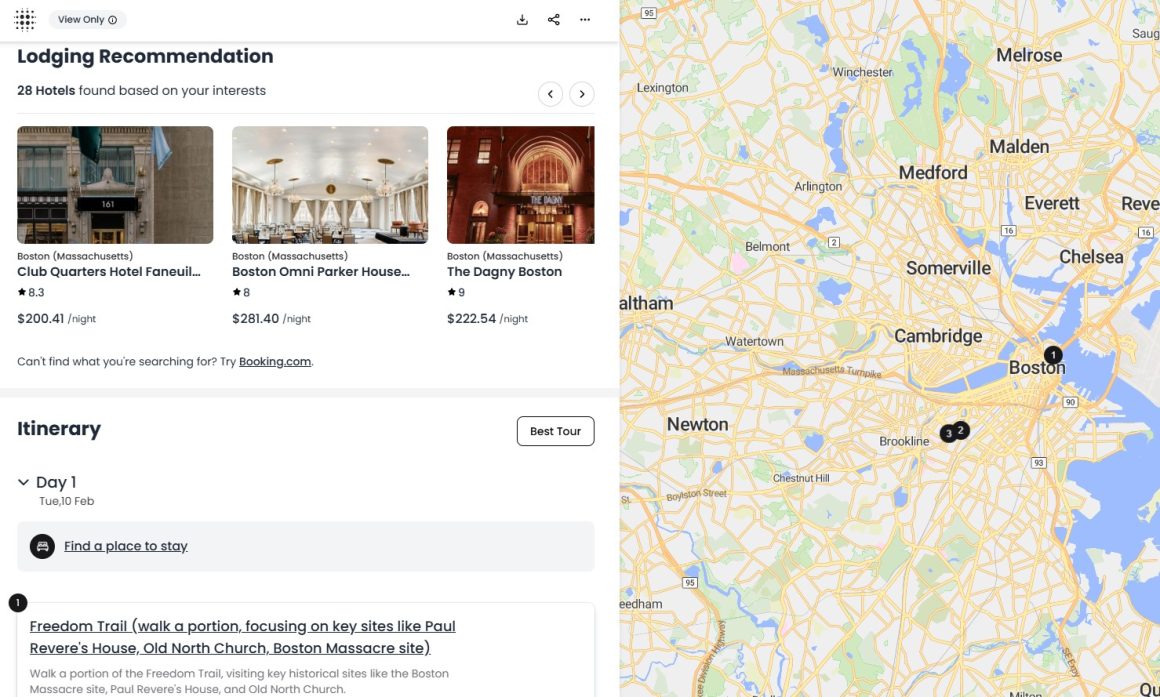

It’s not perfect: our session stalled once with a 404 error and the AI can be slow to generate.
Pros: detailed itineraries, hotel recommendations, transparent cost estimates, the ability to download plans as a PDF for offline use, plus a regularly updated blog with eVisa guides and hotel lists across destinations.
Cons: slow loading, occasional 404 errors, itineraries can feel too rigid for spontaneous travelers.
iplan.ai App
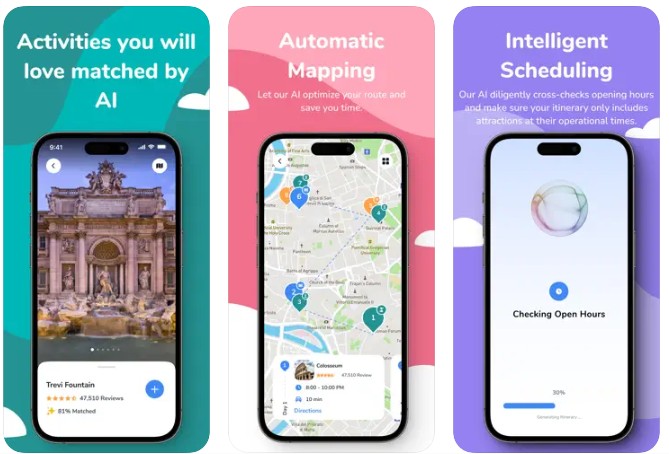

Iplan.ai is designed for travelers who want structured days. It doesn’t just suggest “things to do” – it builds a minute-by-minute itinerary, complete with opening hours, travel times, and maps you can follow on your phone. The app shows you activities matched by AI, plots them on an optimized route, and adjusts your schedule so you don’t turn up when museums are closed. You can share the plan with others and collaborate on edits in real time.
The homepage promises speed and personalization: you enter where you’re going, who you’re with, your interests, and your dates. Within seconds, you get a visual map with stops, approximate times, and cost estimates. The app markets itself as always “up to date, fast and reliable.”
But there are caveats. The “About Us” page offers no company details or contact information. After digging, we found it’s connected to Voyage AI, a Palo Alto start-up (acquired by MongoDB in 2023) specializing in embeddings and rerankers. On the App Store, reviewers note limited variety in results. One user reported entering multiple preference sets for San Francisco, only to be given nearly identical itineraries.
Pros: intelligent scheduling with real opening hours, optimized mapping, collaborative editing, PDF export, strong user rating (4.5★ from 1.4K reviews on Apple’s App Store).
Cons: no transparency on company ownership on About us, limited variation in itineraries, some features locked behind in-app purchases.
Locals Insider verdict: polished on the surface, but under the hood it feels like a generic AI itinerary engine with thin customization.
AI Travel Itinerary Planning Tools Compared
| AI Travel Planner | What It Does | Best For |
|---|---|---|
| Mindtrip | Chatbot + interactive Google Maps planner with guides | Everyday inspiration and collaborative trip planning |
| Tryp.com | AI finds cheap multi-city trips with bundled tickets | Budget travelers, flexible dates |
| Trip Planner AI (Layla) | Chat-style itineraries pulled from social media, behind paywall | Packaged plans if you don’t mind subscribing |
| GuideGeek | AI assistant in WhatsApp, Instagram, Messenger | On-the-go local tips in 50+ languages |
| Expedia AI Trip Match | Converts Instagram Reels into day-by-day itineraries | Social-first travelers |
| Wonderplan | Questionnaire-based itineraries with budgets and hotels | Structured planners who like cost breakdowns |
| iplan.ai | Minute-by-minute itineraries with maps and times | Precision planners who want rigid schedules |
Locals Insider Verdict
Based on our tests, Tryp.com came out on top. It’s fast, neatly built, and genuinely surprises you with cheap combinations you wouldn’t find elsewhere. The trade-off: it’s focused squarely on cheap travel, often bundling low-cost flights with hostels or shared stays.
The others lean heavily on ChatGPT-style bots. Some occasionally recommend places that don’t exist, while others hide results behind subscriptions or push affiliate bookings through GetYourGuide or Viator. They can be fun to experiment with, but less reliable for travelers who want practical, trustworthy planning.
Locals Insider takeaway: if you’re flexible and budget-driven, Tryp.com is the only one we’d suggest using regularly. The rest still feel more like experiments than everyday essentials.






